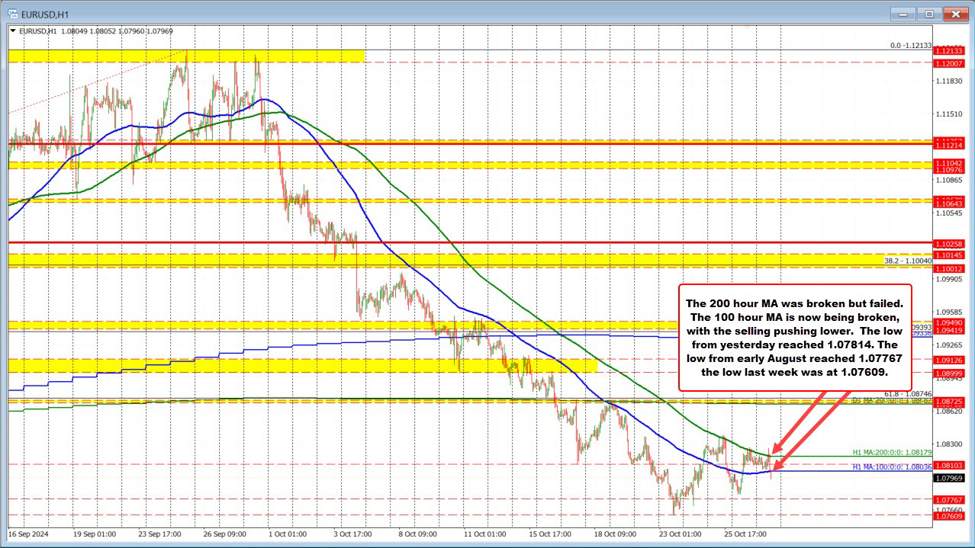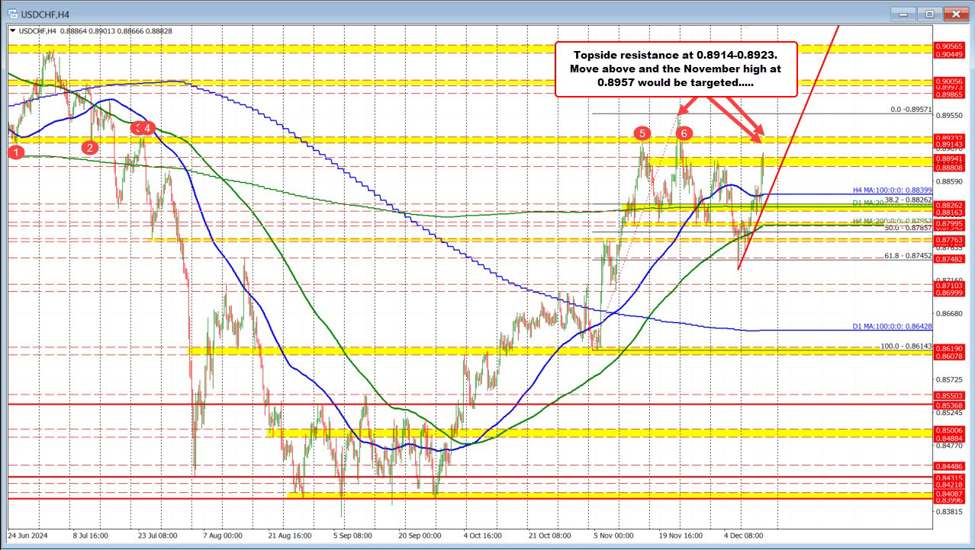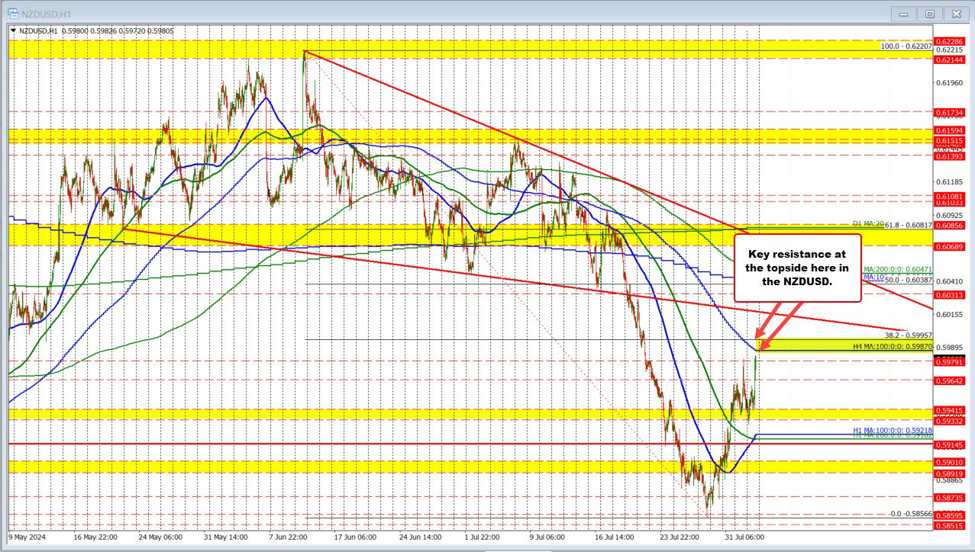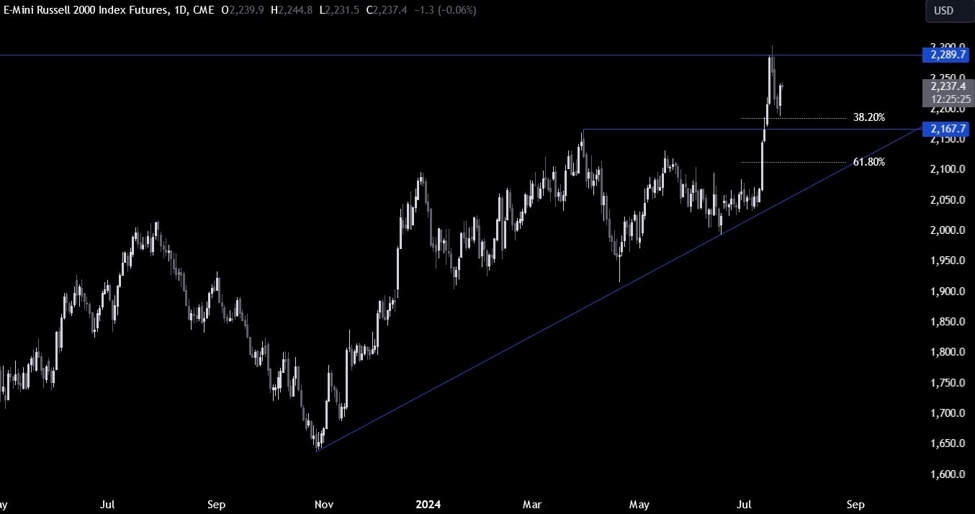As the North American session begins, what are the key technical levels in play? and why?
EURUSD: The EURUSD moved lower to start the US trading day yesterday, only to rebound higher into the European session and the start of the US session. The high prices yesterday moved up to once again test the 200-hour MA. On Friday, the price moved up to test that MA as well – and found willing sellers. The day closed with the price between the 100 hour MA below at 1.0802 and the 200-hour MA above near 1.08206. Something had to give.
And today, the “give” did not happen until the European morning session. The price finally broke a MA target wth a break above the 200 hour MA, but instead of igniting more buying and a move to the upside, the initial move was higher but after reaching 1.08256 (the 200 hour MA was at 1.08179, the price reversed and starts the US session below the 100 hour MA at 1.08037. The buyers had their shot. The sellers are taking charge. The low yesterday reached 1.07814. The low from the early August reached 1.07767. Both are targets today.
USDJPY: The USDJPY had a volatile up, down and back up trading day yesterday closing higher on the day (the price did gap higher following Japan’s election, where the ruling coalition (LDP/Komeito) lost its majority. The pair rose by about 100 pips at the end of the day.
Technically, the pair in the US session moved up to test the 61.8% of the move down from the July high at 153.40 and found sellers. The high price in the US session stalled at 153.37, just 3 pips short of the retracement level. Sellers leaned.
In trading today, the USDJPY dipped modestly in the Asian session after Japan employment rate came in at 2.4% vs 2.5% last month (and 2.5% estimate), and continued that move into the early European session. The low reached 152.749, which like yesterday, approached the 100-hour MA, but still was quite short of the MA level. On Friday, the price moved to that MA and found willing buyers increasing that MAs level going forward. On the move back higher, the price is now trading back above and below the 61.8% retracement (at 153.40). Buyers and sellers are stalling new that retracement level and waiting for the next shove. The tilt is to the upside, but it needs that push with the high price from yesterday at 153.88 the next obvious target. It would open the door for more upside momentum.
Perhaps the best way to look at the market is if the price can stay above last week’s high at 153.18, the buyers are in firm control. Move below, and the buyers might give up and look for rotation back down toward the 100-hour moving average again.
GBPUSD: The GBPUSD buyers had their shot yesterday when the price moved above the 200-hour MA (green line on the chart below) but could not sustain momentum. The shot missed.
A week ago on Monday and the week before also saw the buyers take shots on the break of the 200-hour MA only to miss. Sp although the 200-hour MA has been moving lower and making it easier for buyers to take control, there still is an upside apprehension. Next week, the BOE meets with expectations for a cut in rates.
The failure gave the sellers the go-ahead to push lower (and they did). However, the low price in the US session stalled did move below the 100-day MA at 1.29723, but could not get below the 100-hour MA at 1.2967. I guess both buyers and seller had their shot and both missed. Today, the sellers tried to break lower with the 100-hour MA broken in the late Asian session, but that failed too. The price has moved back above the 200-hour MA (green line) again. The price action remains uncommitted with a failed break in the European session but buyers are trying again in the early US session. The high yesterday yesterday near 1.3000 (and from Friday too) if broken would give the buyers more confidence and have traders looking toward the 100 bar MA on the 4-hour chart at 1.30246. Get above it and 1.30488 would be eyed (50%). Fail….and the 100-day/100 hour MA restarts the “wash and rinse cycle” seen recently. UGH.
USDCHF: The USDCHF moved higher in sympathy with the rising USDJPY in the Asian session yesterday and pushed above its 100-day MA in the process at 0.86841. The high reached 0.86995 – just short of the natural resistance target at 0.8700 and after moving back below the 100-day MA at 0.8641, turned buyers to sellers and closed near the low for the day.
The low from last week stalled at the broken 38.2% of the move down from the July high at 0.86318. Staying above that retracement level is key technically for the buyers if they are to keep some control.
In trading today, the price in the European session has extended higher. The price is back above the high from 2-weeks ago at 0.8668. The 100-day MA at 0.86843 is the next target to get to and through again to shift more of the bias to the upside. Support at 0.8649 and the 38.2% at 0.86318.
USDCAD: The USDCAD started the week with a narrow trading range, and today that pattern has continued with only a 24-pip trading range for the day. The price remains near the highs and continues to trade above and below a swing area 1.3888. The more recent move into the North American session has been to new session lows at 1.38758, but the price is already bouncing and trades at 1.3889 currently.
Overall, the buyers remain more control as Canada is struggling with political uncertainty, the prospects were the unwind of immigration slowing growth, a housing market that is out of balance and consumers that are still feeling the pinch from higher rates. Employment holds up but will it from long. A move lower would need to get below 1.3864 and then a swing area between 1.3833 and 1.38472 disappoint buyers, and may need to get below the floor from last Tuesday and Thursday of last week at 1.3132, to get more buyers turning to sellers. Until then, the upside remains the path of least resistance for the pair.
AUDUSD: The AUDUSD moved down to test the 61.8% of the move up from the August low at 0.6575 yesterday and bounced. However, by the end of day, the price had rotated back down toward that level.
In tradng today, the selling has been able to extend below the 61.8% level and although there has been moves back above that retracement as well, the breaks have been limited. The sellers remain more in control.
Sellers are looking to get below the low from August 15th at 0.65608. More selling below that level would increase the bearish bias and set the 61.8% retracement as THE close risk-defining level and give the go-ahead to push lower.
NZDUSD: more
This article was written by Greg Michalowski at www.forexlive.com.
Source link




